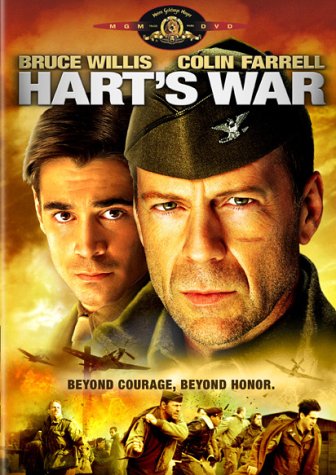
HART’S WAR
US, 2002, 125 minutes, Colour.
Colin Farrell, Bruce Willis, Terrence Howard, Cole Hauser, Marcel Iures, Linus Roche, Vicellous Shannon, Rory Cochrane, Adrian Grenier, Michael Weston.
Directed by Gregory Hoblett.
Hart’s War is, in some ways, a throwback to the prisoner-of-war films so popular in the 1950s. It focuses on a group of men, their interactions, the digging of a tunnel. However, there is a big difference with this film insofar as it focuses on American racist themes.
Colin Farrell plays an officer who is captured in the Ardennes at the end of 1944 and transferred to a prisoner-of-war camp where Bruce Willis is in charge of the prisoners. Marcel Iures, the prominent Romanian actor, is the camp commandant. Two black aviators are downed and imprisoned, and are segregated by most of the men. The film highlights the racist attitudes of so many Americans of the period. They are played by Terrence Howard and Vicellous Shannon.
Cole Hauser plays a contact between the Germans and the American troops and is murdered. One of the black aviators is framed for the murder, a trial is demanded and granted by the commandant. Colin Farrell as Thomas Hart is to be the defence counsel.
The film is interesting in the presentation of the court, the defence made by a man who was a law student before enlisting but not a lawyer. There various twists in revealing what actually happened. There are also themes of honour, duty and personal integrity.
Colin Farrell was in the early years of his international fame. Bruce Willis gives a solid performance as the severe American commander.
The film was directed by Gregory Hoblett who had won a number of awards for directing Hill Street Blues and other television series. He made quite an impact with his first feature film, Primal Fear, also a murder mystery with a court case and twists. Other of his films include Fallen, Fracture, Frequency.
1.The tradition of the war film, the prisoners of war, the difference with the racism theme, the court case? The sixty years hindsight perspective?
2.Europe in 1944-45, the winter, the Battle of the Bulge, American forces, the German victories and then retreat? The situation for the end of the war?
3.The prisoner-of-war camp, the huts, the grounds, the exteriors, the tunnel? The musical score?
4.The title, the focus on Hart, Colin Farrell as Thomas Hart, young, his job, the assignment and the loss of direction, the German attack, the group lost, the wounded and dead? His being taken, interrogated, sent to the camp?
5.Hart in the camp, McNamara? and his orders, the hut, Bedford and the others, Bedford and the boots and asking for the watch? Ross and his friendliness?
6.Colonel McNamara? as officer, his relationship with his men, interactions with the commandant, his personality? His experience of the war? The contrast with Colonel Visser, the issue of the Geneva Convention not applying, the setting up of the court, the relationship with the guards, bartering with the prisoners?
7.Bedford and his bartering, his personality, racist, exploitative, arranging for the death of Archer? His racism? Framing of Lincoln Scott for the murder of Bedford? Bedford and the information to the commandant, getting the radio etc?
8.The digging of the tunnel, the hard work, Hart not knowing, McNamara? and his orders, concealing where the men went out of the huts?
9.Scott and the accusation, Scott in himself, the Tuskagee airmen, their experience of prejudice, working doubly hard to graduate, crashing in Europe, on the outer with the men? The hut, the theatre? Archer’s death? Bedford’s death? Scott being framed, his anger? His words about racism and experience?
10.McNamara and the trial, the commandant agreeing? Hart, the issue of the murder scene, the photos, evidence, testimony? McNamara? and his pressure? The commandant and the interview, giving him the law book? Hart utilising it, especially against McNamara?
11.The case, Hart and his Yale background, his mistakes, McNamara? as hostile, McNamara’s? reaction? Scott and the charges, the prosecutor and his questions, the nature of the defence, the photos, the black on the face of the murdered man, the prosecutor suggesting it was ashes from the kitchen? The arguments? Racism?
12.The interrogation of the guards, the interrogation of the commandant and his reaction? The deals?
13.Hart and his following the soldier at night, discovering the tunnel? The discussions with Scott, the photo of his son, the issue of honour? Hart going back into the trial, covering the time for the escape, confessing that he was guilty?
14.The escape, the commandant and his checking, the execution planned for Hart, the explosion of the factory, McNamara’s? return, his sense of honour, dying in the place of Scott?
15.The end of the war, freedom, the aftermath?
16.The strong theme of bigotry, lynch law in the prisoner-of-war camp compared with such states as Alabama? The relevance of the theme today?